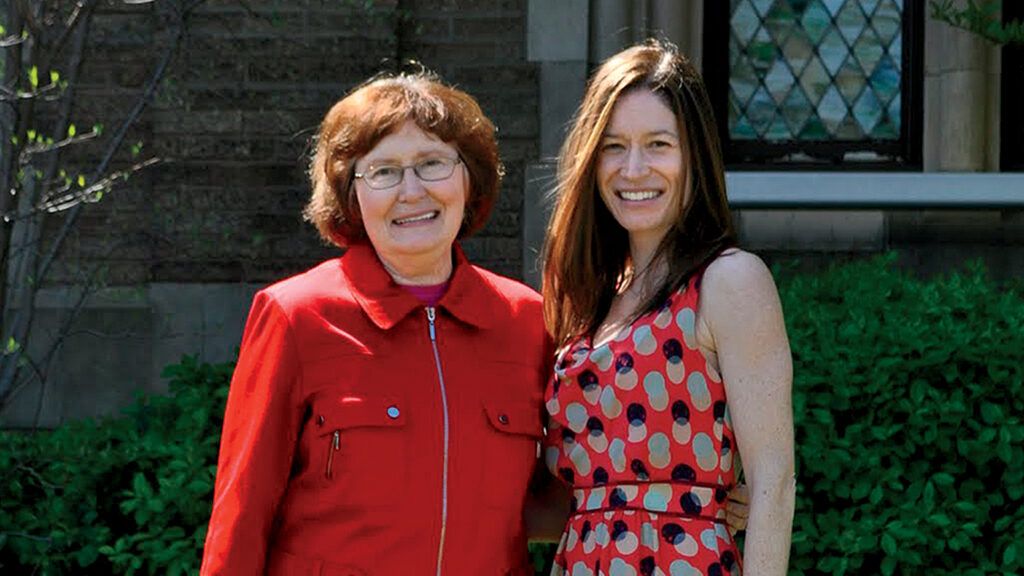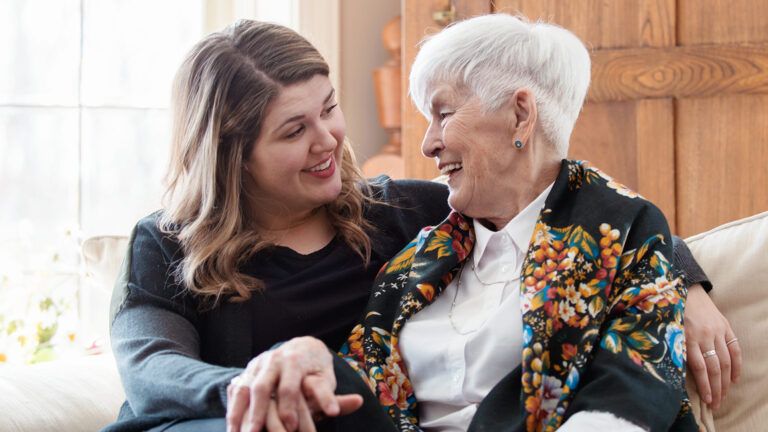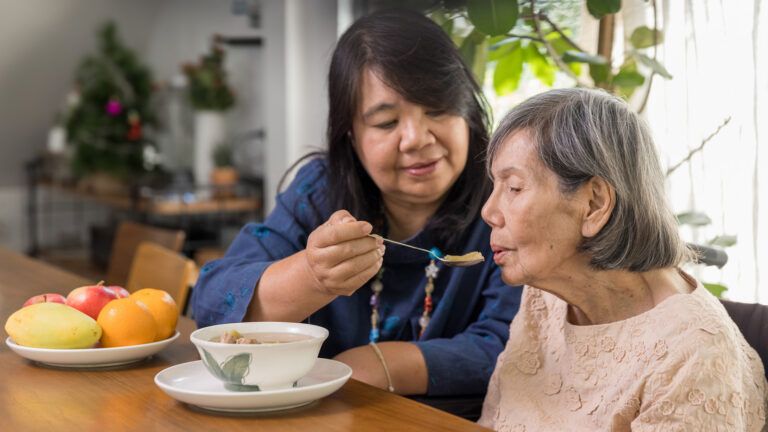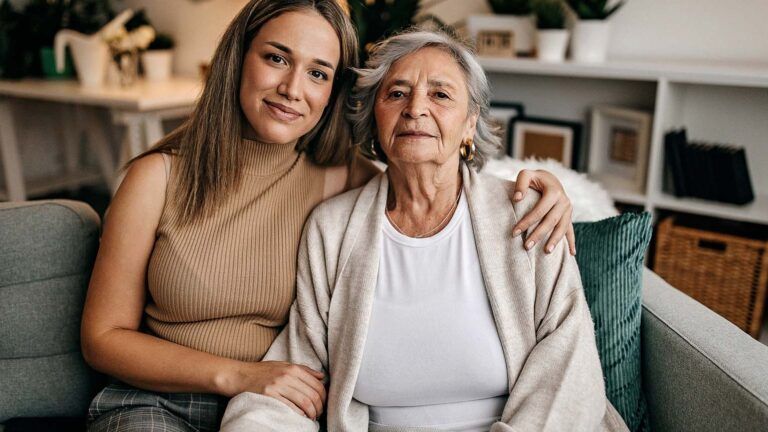In my mother’s room at the memory care center, I dug through the clothes piled on the floor looking for a sweater and scarf. Her closet had plenty of hangers, but Mom, who’d always been tidy, no longer remembered to use them.
“What’s happening, dear?” she asked, fuzzy on my name.
“It’s Christmas Eve,” I reminded her. “We’re going to church. One of your favorite places.”
“We always go to such fun places,” Mom said, smiling vacantly. It was unclear what, if anything, she had understood.
I glanced at my watch. “We need to hurry.” My dad, husband and three kids were meeting us at church for the afternoon service. Even though I wanted to get Mom settled in a pew early, everything, even the simplest tasks, took longer now.
When I was making the 700-mile trip from my home in New Jersey to southern Indiana, where my parents lived, getting Mom to church had felt like my top priority. This would be Mom’s first Christmas at church since she’d gone into memory care. The Christmas Eve candlelight service was one of our traditions, and I’d wanted her to have something familiar to hold on to.
But now I wondered. Mom’s Alzheimer’s disease had advanced. She’d barely left the facility in months. The church would be packed, and crowds sometimes overwhelmed her. Did Christmas have any meaning for Mom anymore?
As a long-distance caregiver, I’d had to let go of so much over the past 10 years, so much of the relationship I’d cherished between Mom and me. I’d even struggled to admit that Alzheimer’s could be the cause of her slipping memory, as if denial would somehow keep the demon at bay.
We’d talked on the phone every day back then. “I’m forgetting things,” she’d said during one call. “I think something is wrong with me. I’m going to see the doctor.”
“Mom, you’re just doing too much,” I’d insisted. She was only 69, a retired teacher with a sharp mind. “You’re so busy gardening and volunteering. All your activities at church.”
Faith. That was one of the big differences between us. Mom rarely missed Sunday services or Bible study. She prayed often. When I was growing up, it was a given on Sunday mornings that Mom and I would be in a pew at our Methodist church in Jeffersonville, sitting beside her mother, whom we called MeMe. (My much older brother had already flown the nest when I was little, or he would’ve been there too. )
“Your faith will always be something you can rely on,” Mom told me. “You need to know God will be there to catch you when you fall.” For MeMe, church was a social event, but for Mom it was about feeling close to God, basking in his loving spirit. Even as a girl, I could see that.
I loved listening to Mom sing the old hymns in church, her voice soaring. The song coming from her lips was so joyful, as if she were one with the music. It was amazing.
Even so, after I left Jeffersonville to follow my dream of becoming a writer in New York City, I left church behind me too. I was focused on building my career, getting married, having kids.
Mom hated that her own children lived so far away; my brother had moved to Texas. I came home as often as I could. Mom and I even took a girls’ trip to England, Wales and Ireland. Mostly I stayed close through our daily calls.
MeMe had developed Alzheimer’s, and Mom had cared for her until the end. Mom was terrified that she too would fall victim to it. She didn’t want to be a burden to my father, my brother and me. I knew I couldn’t be the caregiver she had been. Not from New Jersey, where life was filled with responsibilities, a mortgage, young children.
“You don’t have dementia,” I’d told Mom over the phone. Was I trying to reassure her or myself?
Days later, while driving to nearby Louisville, Kentucky, to a doctor’s appointment, Mom got totally lost. She’d had to call Dad; he drove to her so she could follow him home.
“I don’t know what’s happening to me,” she said. “I’m scared, Kristen.”
The doctor’s diagnosis was inconclusive, but I grew more anxious with each passing month and with each troubling call with Mom. I was no longer in denial about her condition. I’d slipped into a kind of depression at the thought of losing Mom bit by bit to a disease that steals who we are. And of not being able to be there for her when she needed me most.
One Sunday morning, I decided to go to church alone. I picked a mega-church I’d often walked by. I remembered how loud and joyful the music had sounded, even from the street. The parishioners seemed happy and animated as they streamed outside after services. I wanted to feel what they were feeling.
I took a seat in a crowded pew. “We all suffer physical and mental health crises,” the pastor said. “Believe in God, and he will produce miracles.”
What kind of miracle could I hope for? I wondered. There’s no cure for Alzheimer’s, after all.
Still, when the service was over, the people around me greeted me with such genuine warmth and caring. I went back the next Sunday and the one after that.
I kept going. I learned the words to the praise songs. I started reading my Bible and praying, devoting time each day to nourishing my long-neglected spiritual side.
Mom declined slowly yet inexorably. Dad hid her car keys. Not being able to go out by herself devastated her. I pushed to get Mom into a memory care facility. I called facilities across southern Indiana. But Dad and my brother felt it was too soon.
I poured out all my frustrations, my fears, my grief to God. My pastor spoke often about how faith could take the place of worry. Letting go, living in the moment and trusting the future to God. The more I grew spiritually, the more I wanted to learn. I started practicing yoga, then eventually trained to become a yoga teacher, exploring even more deeply how to stay present.
My daily conversations with Mom were becoming more one-sided. I would tell her in detail about my family, the kids’ sports, my writing assignments, the TV shows we were into, what we ate for dinner, the songs I sang at church. It wasn’t always clear how much she registered, but Mom and I were connecting. That’s what I told myself, anyway.
One day, while I was at the yoga studio where I taught, Dad’s number popped up on my cell phone. Something’s happened to Mom! I thought. But it was Dad who needed help. He’d gone to the VA hospital with chest pain. The doctor had ordered emergency quadruple bypass surgery for the next day.
Dad was scared for himself and even more worried about Mom. Could I come home? I raced to my house. My husband booked me a ticket for the next flight out.
I stayed in Indiana for two weeks. My brother also came to help. Mom was confused and upset by everything that was happening. I called eight agencies and found a home health care aide who could put in a full day with Mom and Dad after I’d gone back to New Jersey. She was a sweet woman older than my parents, who were in their late seventies by then.
Meanwhile, I put Mom on a waiting list at a memory care center. I didn’t want to upset Dad by talking to him about it, but there was no doubt in my mind that Mom needed 24/7 care.
A room became available in January 2018, just as Dad arrived at the same conclusion on his own, surely an example of God at work. I went back to Indiana to help with the move. We packed Mom’s clothes, family photos and favorite coloring books. It was hard for everyone, but Mom was safe, which was the best I could hope for.
I couldn’t call her every day; a conversation didn’t hold her attention for long. Instead, I took to calling Dad every evening. In a way, it felt like honoring Mom. She’d been devoted to him for their 60-year marriage.
Through it all, I held fast to my faith, to the support and friendship I’d found at church. One Sunday, I stood to the strains of a praise song I’d come to love, “The Great I Am.” I raised my arms high, my body moving to the music, letting the words wash over me. “I want to be near, near to your heart. Loving the world, hating the dark.”
The voices around me lifted, joyous. It reminded me so much of childhood Sundays in Indiana, sitting beside Mom in church, listening to her sing out her love for the Lord. In drawing me back into his house, closer to him, God had given me a way to draw closer to my mother, a connection that went beyond words.
The faith that had sustained her had finally taken hold in me, and I couldn’t help but think this was what she would have wanted. Though we were separated by the miles between us, by her loss of memory, here in church, basking in the light of God’s love, I felt so close to my mom. This was my miracle.
That Christmas Eve in Indiana, after Mom had gone into memory care, I got her dressed and drove us to church just before the candlelight service. Our family filed in. “Take our seats,” a young couple with a baby said. They were in the back row. Mom could sit near the end of the pew between Dad and me. Perfect.
We got settled, and the music—all the familiar carols—began: “The First Noel,” “Joy to the World,” “Angels We Have Heard on High.” Mom hummed and even sang some of the lyrics. She held Dad’s hand and mine. Then she closed her eyes and bowed her head.
“What is she doing?” Dad whispered to me.
“She’s praying,” I said. Dad had tears in his eyes.
Did Christmas still have meaning for Mom? I didn’t have to wonder anymore.
At the end of the service, as the sanctuary went dark and the congregation began singing “Silent Night,” I lit her candle. Mom’s eyes never left the flame as she mouthed the words. After the final verse, she puckered her lips and blew out her candle.
“Thank you,” she said. “That was beautiful.”
For more inspiring stories, subscribe to Guideposts magazine.






